 Petzlover
Petzlover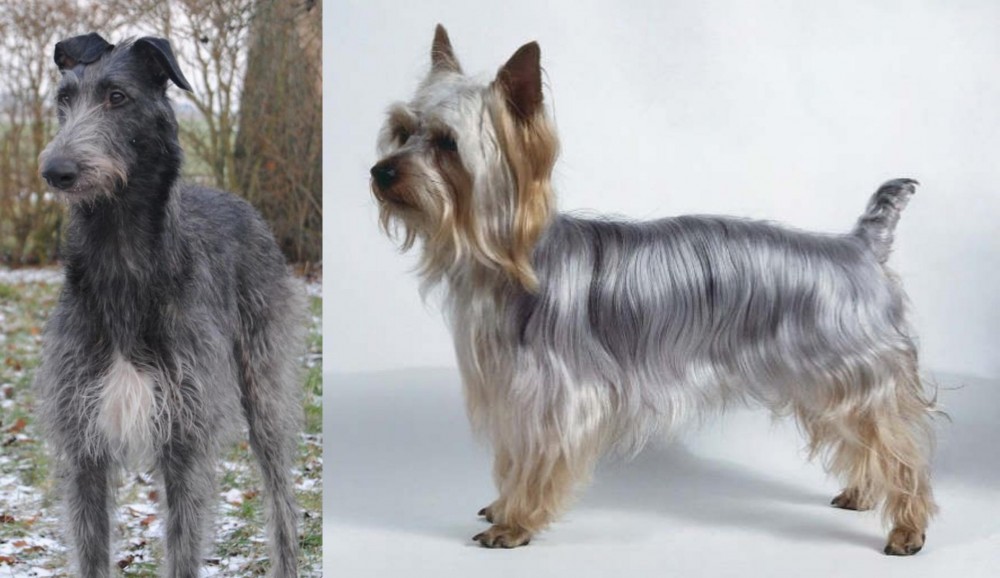 Scottish Deerhound is originated from United Kingdom but Silky Terrier is originated from Australia. Scottish Deerhound may grow 55 cm / 22 inches higher than Silky Terrier. Scottish Deerhound may weigh 45 kg / 100 pounds more than Silky Terrier. Scottish Deerhound may live 5 years less than Silky Terrier. Scottish Deerhound may have more litter size than Silky Terrier. Scottish Deerhound requires Low Maintenance. But Silky Terrier requires Moderate Maintenance
Scottish Deerhound is originated from United Kingdom but Silky Terrier is originated from Australia. Scottish Deerhound may grow 55 cm / 22 inches higher than Silky Terrier. Scottish Deerhound may weigh 45 kg / 100 pounds more than Silky Terrier. Scottish Deerhound may live 5 years less than Silky Terrier. Scottish Deerhound may have more litter size than Silky Terrier. Scottish Deerhound requires Low Maintenance. But Silky Terrier requires Moderate Maintenance
 The Scottish Deerhound is considered the Royal Dog of Scotland. It is a sighthound that is large and bred to hunt large Red Deer. They are similar in appearance to the Greyhound, but they are bigger and heavier. Closely related to the Irish Wolfhound, they were used in creating it. The Scottish Deerhound is an ancient breed that is now very rare. It can trace its lineage to the 16th and 17th centuries.
The Scottish Deerhound is considered the Royal Dog of Scotland. It is a sighthound that is large and bred to hunt large Red Deer. They are similar in appearance to the Greyhound, but they are bigger and heavier. Closely related to the Irish Wolfhound, they were used in creating it. The Scottish Deerhound is an ancient breed that is now very rare. It can trace its lineage to the 16th and 17th centuries.
The Deerhound was a favorite of hunting nobility and could not be kept by any person or household that did not have at least the rank of earl. Despite this history the Scottish Deerhound was not considered separate from the Highland Greyhound and other staghounds until the 19th century. They were bred to stalk or “course” the red deer and were used extensively for this purpose until the beginning of the 20th century. At that time there was a need for smaller, slower deer tracking dogs.
At the start of the 20th century, the land for deer hunting had grown smaller and so had the deer. Also, the invention of the rifle made the fast Deerhounds who could cover large tracks of ground in minutes, no longer a necessity for successful hunting. As the clan systems fell and the nobility rose, the Deerhounds became the dog for nobility and landowners. There were a few non-nobilities who also kept them and hunted with them. As they were less needed for hunting a few households kept them as show dogs.
In the United States and Canada, both the Scottish Deerhound and the Greyhound were used for hunting wolves and deer. In Australia, the Kangaroo Dog – a deerhound crossbreed, and Deerhounds were used to hunt wild boar, emu and kangaroos. The Deerhound is one of the oldest of the breeds that are Greyhound-like. The Deerhound is not as fast as the Greyhound if they are running on a smooth surface. Get them on a rough surface and the will out that Greyhound. They appear to be larger and rougher than they really are. This gives them an advantage over the lighter, smaller Greyhound.
The Deerhound was a contributor to development of the Irish Wolfhound toward the end of the 19th century.
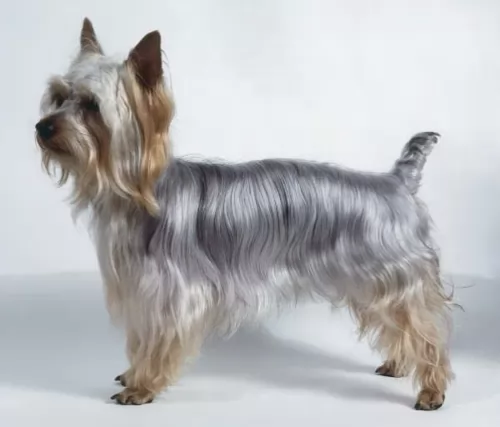 It is the Yorkshire Terrier and the Australian Terrier which are the ancestors of the Australian Silky Terrier. This is by no means a new dog breed. It is believed that the breed came into existence at the end of the 19th century.
It is the Yorkshire Terrier and the Australian Terrier which are the ancestors of the Australian Silky Terrier. This is by no means a new dog breed. It is believed that the breed came into existence at the end of the 19th century.
The dog’s purpose is to be a companion. This little canine wasn’t always known as the Silky Terrier, but in 1955 the name became officially Silky Terrier.
The breed is also recognized by the Australia National Kennel Council in the Toy Group. In fact the breed is recognised by a number of the major kennel clubs as well as the Fédération Cynologique Internationale.
 The Scottish Deerhound looks a lot like the Greyhound, except it is heavily boned and larger in size. The Deerhound is also different in several other ways. Instead of the Greyhound, the Scottish Deerhound is more closely related to the Irish Wolfhound than the Deerhound. The Deerhound is a large, rough coated breed. It is a very tall breed; in fact, it is the tallest of all sighthounds.
The Scottish Deerhound looks a lot like the Greyhound, except it is heavily boned and larger in size. The Deerhound is also different in several other ways. Instead of the Greyhound, the Scottish Deerhound is more closely related to the Irish Wolfhound than the Deerhound. The Deerhound is a large, rough coated breed. It is a very tall breed; in fact, it is the tallest of all sighthounds.
The Deerhound has a long head with a flat skull and a muzzle that tapers at the end. They have dark eyes and a scissor bite with a tail that can be either curved or straight. The hair on their tails almost touches the ground. The rest of its coat is wiry and harsh with a beard, mustache and mane. The ears are soft and can be either held semi erect or folded against their head. Their coat is gray or grey-blue today but in the past, it might have been brindle, red fawn or yellow.
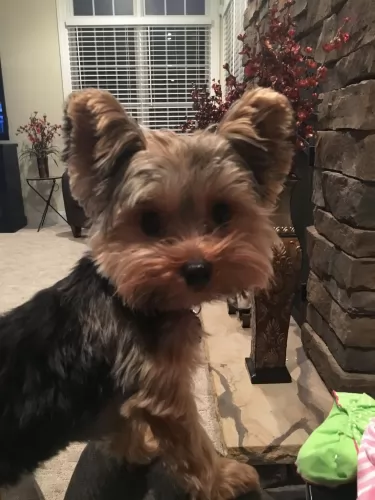 This is a small dog breed, standing at just 21 to 26cm in height and weighing in the region of 4 to 5kg. He may be a toy dog, but he is robust and athletic.
This is a small dog breed, standing at just 21 to 26cm in height and weighing in the region of 4 to 5kg. He may be a toy dog, but he is robust and athletic.
The ears of the Silky are small and erect with a lot of silky hair that hangs down and the tail is preferably docked and held high.
His coat is eye-catching – straight, long, silky and shiny. If it is left unclipped, it will reach the floor. The colour of the coat is a tan and silvery grey.
The temperament of any dog is affected by things such as heredity, upbringing and the training and socialization he receives.
Small he may be, but the Silky Terrier can benefit from training as he is feisty and strong willed.
He is energetic and always ready for action. He is ready to come bounding after you and join his human family for any action they’re into. He is playful, bold, loyal, tenacious, independent, social and lively and he makes a good playmate for children.
He might tend to be a bit snappy and aggressive towards other dogs. He is also great as a watchdog, barking and alerting you to strangers.
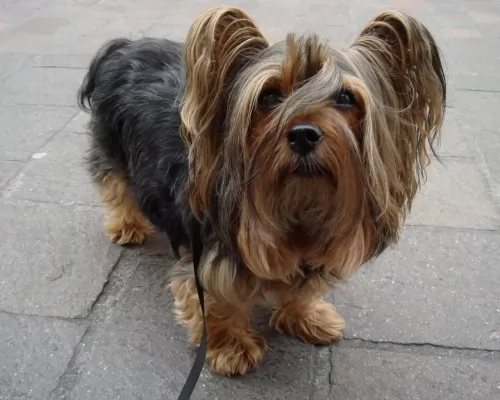 The silky terrier is a good choice for those who want a smallish dog but one which is robust and adventurous.
The silky terrier is a good choice for those who want a smallish dog but one which is robust and adventurous.
Your Silky is a loyal dog who loves spending time with his human family, wanting their companionship.
He will need to be physically and mentally stimulated as he is bright and intelligent. He can adapt to life in the city or the countryside but will need to be well exercised wherever he is.
 The Scottish Deerhound does face some serious challenges on the health front. These include:
The Scottish Deerhound does face some serious challenges on the health front. These include:
• Cystinuria – recessive disorder that causes an inability for cystine to be filtered from the urine.
• Gastric Dilatation Volvulus – otherwise known as bloat and it can be life threatening if not treated quickly.
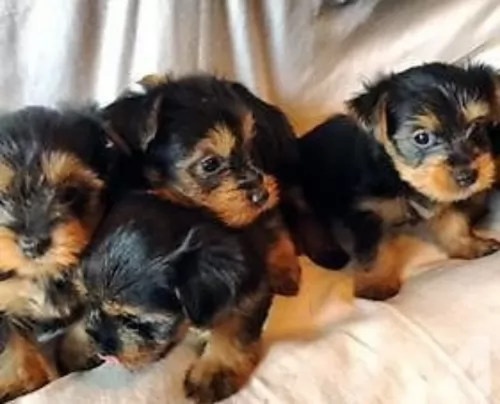 Just like most other dogs, the Silky Terrier isn’t likely to get sick easily, but he can still succumb to any one of the dog illnesses there are.
Just like most other dogs, the Silky Terrier isn’t likely to get sick easily, but he can still succumb to any one of the dog illnesses there are.
This is when your pet isn’t able to regulate blood sugar levels. Your dog will be drinking a lot more water than usual and also be urinating more often. The vet will explain to you a special diet for your pet and how the disease can be controlled with insulin.
This is a disease seen more often in smaller dogs like the Silky. It is caused by an obstruction in the airway and symptoms can include labored breathing and coughing. Your dog will need to be treated with anti-biotics and possibly surgery.
 1.Feeding the puppy – Feed a high quality large or x large puppy dogfood at least 3-4 times a day. Do not overfeed.
1.Feeding the puppy – Feed a high quality large or x large puppy dogfood at least 3-4 times a day. Do not overfeed.
2.Feeding the adult – Feed a high-quality adult large or x large dog food once or twice a day. Do not overfeed.
4. Games and Exercises – The Deerhound needs plenty of exercise in a safe place where they have plenty of room to run. A small yard or life on a leash are not enough for this energetic breed. Play fetch, course running, Like the Greyhound they will be couch potatoes if you let them but that will hurt their health. Lure Coursing or hare coursing are good. Coyote hunting. Find space where they can run for the joy of running. Never force them to run – like along a bicycle
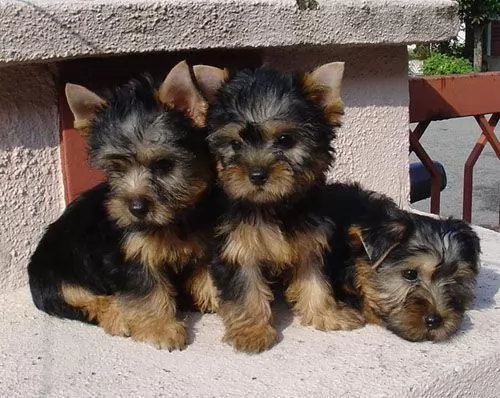 You can imagine that with that silky hair, you’re going to have to be brushing your furry friend quite a bit. It’s such soft, silky hair that it easily picks up burrs and gets matted. You may want to get your pet to a professional groomer to have the hair cut. As you brush him, check for any unusual lumps and keep an eye on his skin.
You can imagine that with that silky hair, you’re going to have to be brushing your furry friend quite a bit. It’s such soft, silky hair that it easily picks up burrs and gets matted. You may want to get your pet to a professional groomer to have the hair cut. As you brush him, check for any unusual lumps and keep an eye on his skin.
Check your pet’s teeth. Bad teeth can cause bacteria that can affect every part of your dog’s body. Check inside his ears for redness and check his eyes that there is no discharge. Trim the nails. If you don’t have the time or the inclination to do all these things for him, make an appointment with the professional pet groomers who will do it for you.
The Silky Terrier will need quality food if you want him to enjoy a long, healthy life. Its always a good idea to have some of the top quality commercially manufactured dog foods with you for convenience. If you want to give him the best there is, some home-made food will be a good choice, if you keep it simple.
Boiled chicken, brown rice or pasta and spinach, sweet potatoes and carrots are a healthy choice for your pet – plain and simple without any exotic spices that could upset his stomach. Your dog will lap it up and you will see how he loves it. Chop the home-made food up and add some of it into his dry kibble as a treat twice a week.